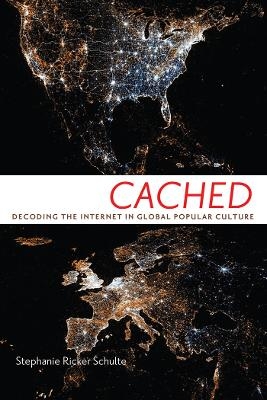
Cached
Decoding the Internet in Global Popular Culture
Seiten
2013
New York University Press (Verlag)
978-0-8147-0867-5 (ISBN)
New York University Press (Verlag)
978-0-8147-0867-5 (ISBN)
In the 1980s and 1990s, the internet became a major player in the global economy and a revolutionary component of everyday life for much of the United States and the world. The author illustrates the conflicting and indirect ways in which culture and policy combined to produce this transformative technology.
“This is the most culturally sophisticated history of the Internet yet written. We can’t make sense of what the Internet means in our lives without reading Schulte’s elegant account of what the Internet has meant at various points in the past 30 years.”
—Siva Vaidhyanathan, Chair of the Department of Media Studies at The University of Virginia
In the 1980s and 1990s, the internet became a major player in the global economy and a revolutionary component of everyday life for much of the United States and the world. It offered users new ways to relate to one another, to share their lives, and to spend their time—shopping, working, learning, and even taking political or social action. Policymakers and news media attempted—and often struggled—to make sense of the emergence and expansion of this new technology. They imagined the internet in conflicting terms: as a toy for teenagers, a national security threat, a new democratic frontier, an information superhighway, a virtual reality, and a framework for promoting globalization and revolution.
Schulte maintains that contested concepts had material consequences and helped shape not just our sense of the internet, but the development of the technology itself. Cached focuses on how people imagine and relate to technology, delving into the political and cultural debates that produced the internet as a core technology able to revise economics, politics, and culture, as well as to alter lived experience. Schulte illustrates the conflicting and indirect ways in which culture and policy combined to produce this transformative technology.
“This is the most culturally sophisticated history of the Internet yet written. We can’t make sense of what the Internet means in our lives without reading Schulte’s elegant account of what the Internet has meant at various points in the past 30 years.”
—Siva Vaidhyanathan, Chair of the Department of Media Studies at The University of Virginia
In the 1980s and 1990s, the internet became a major player in the global economy and a revolutionary component of everyday life for much of the United States and the world. It offered users new ways to relate to one another, to share their lives, and to spend their time—shopping, working, learning, and even taking political or social action. Policymakers and news media attempted—and often struggled—to make sense of the emergence and expansion of this new technology. They imagined the internet in conflicting terms: as a toy for teenagers, a national security threat, a new democratic frontier, an information superhighway, a virtual reality, and a framework for promoting globalization and revolution.
Schulte maintains that contested concepts had material consequences and helped shape not just our sense of the internet, but the development of the technology itself. Cached focuses on how people imagine and relate to technology, delving into the political and cultural debates that produced the internet as a core technology able to revise economics, politics, and culture, as well as to alter lived experience. Schulte illustrates the conflicting and indirect ways in which culture and policy combined to produce this transformative technology.
Stephanie Ricker Schulte is Assistant Professor of Communication at the University of Arkansas.
AcknowledgmentsIntroduction 1 The "WarGames Scenario": Regulating Teenagers and Teenaged Technology 2 The Internet Grows Up and Goes to Work: User-Friendly Tools for Productive Adults 3 From Computers to Cyberspace: Virtual Reality, the Virtual Nation, and the CorpoNation 4 Self-Colonizing eEurope: The Information Society Merges onto the Information Superhighway5 Tweeting into the Future: Affecting Citizens and Networking Revolution Conclusion Appendix Notes Bibliography Index About the Author
| Reihe/Serie | Critical Cultural Communication |
|---|---|
| Zusatzinfo | 2 black and white illustrations |
| Verlagsort | New York |
| Sprache | englisch |
| Maße | 152 x 229 mm |
| Gewicht | 476 g |
| Themenwelt | Recht / Steuern ► EU / Internationales Recht |
| Sozialwissenschaften ► Kommunikation / Medien ► Medienwissenschaft | |
| ISBN-10 | 0-8147-0867-6 / 0814708676 |
| ISBN-13 | 978-0-8147-0867-5 / 9780814708675 |
| Zustand | Neuware |
| Haben Sie eine Frage zum Produkt? |
Mehr entdecken
aus dem Bereich
aus dem Bereich
wie KI und virtuelle Welten von uns Besitz ergreifen – und die …
Buch | Hardcover (2023)
Heyne (Verlag)
CHF 29,90
Eine Einführung
Buch | Softcover (2022)
Springer VS (Verlag)
CHF 46,15


